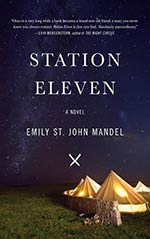
![]() attackofthebooks
attackofthebooks
5/18/2015
![]()
For the longest time, I had no idea what to say about Station Eleven, by Emily St. John Mandel. Not only does it defy description, but the description it does get is pretty accurate... and yet, so wrong.
Here, for example, from the last paragraph of the Amazon description:
"Spanning decades, moving back and forth in time, and vividly depicting life before and after the pandemic, this suspenseful, elegiac novel is rife with beauty. As Arthur falls in and out of love, as Jeevan watches the newscasters say their final good-byes, and as Kirsten finds herself caught in the crosshairs of the prophet, we see the strange twists of fate that connect them all. A novel of art, memory, and ambition, Station Eleven tells a story about the relationships that sustain us, the ephemeral nature of fame, and the beauty of the world as we know it."
So, yes. All that is there. Station Eleven is, sort of, a post-apocalyptic tale, heavily interlaced with flashbacks to before and during the apocalypse. Mandel does a really excellent job of weaving the stories of a cast of individuals together over time and space, and the complex endeavor works well. It's no wonder that no other than George R.R. Martin thought that it should have gotten the nomination for best novel on the Hugo ballot. He loves a complex plot and Station Eleven has got all sorts of complex stuff going on. As Martin says, it really shouldn't work, but it does, and the story ends up being a satisfying read (with one caveat, which I'll mention in a minute).
In any other year, Station Eleven might even have garnered a nomination for the Hugo (if just on the weight of Martin's nod?). I don't know that I would have given it the award, but it's definitely good enough, artsy enough, and different enough to attract the typical Hugo voter's attention. This year, however, with Sad Puppies going on and all sorts of anti-Sad Puppies pushing against Sad Puppy nominations, the typical voter is not typical. For better or worse, Station Eleven just isn't the sort of scifi to catch the attention of the mainstream science fiction reader.
That said, Station Eleven has received all sorts of other awards. These include the Arthur C. Clarke Award for Best Novel (2015), PEN/Faulkner Award for Fiction Nominee (2015), The Rooster - The Morning News Tournament of Books (2015), Women's Prize for Fiction Nominee for Longlist (2015), and National Book Award Finalist for Fiction (2014). You can see that, with the exception of the Arthur C. Clarke Award, none of these are science fiction awards and, frankly, that fits. The book is good, but it's hard to find much about it that is science fiction--well, other than the virus that wipes nearly everyone out. It feels less science fiction and most character study, with a twist of pandemic slipped in for good measure.
Which actually leads me to that caveat I mentioned earlier and why I only give Station Eleven four stars. In as much as it is good writing, there's something that isn't quite fulfilling about it for me. In as much as Mandel focuses the story around a single character--who is dead by the time the apocalypse starts--I found it difficult to know who to cheer for and, perhaps as a corollary to that, what to care about. I was never quite clear where the story was going and what the point was. It was almost like life, moving on and along in spite of tragedy's starring role. History is just one thing after another, and humans will sometimes survive, and sometimes not, will sometimes be good, and sometimes not. If there is anything that is consistent, it's that Mandel is relying on coincidence to fuel the mystery of Station Eleven to continually bring her characters together, over and over, despite all improbability, and after a certain point it seems to belie the seemingly random nature of her story. There just isn't a large enough connection for me in the things that tie her characters together over time and over space to fully suspend disbelief.
Station Eleven pulls in the reader and mystery keeps the reader close. But what remains after finishing is less clear, maybe even forgettable, and perhaps that is why for me Station Eleven is, ultimately, just a good read.